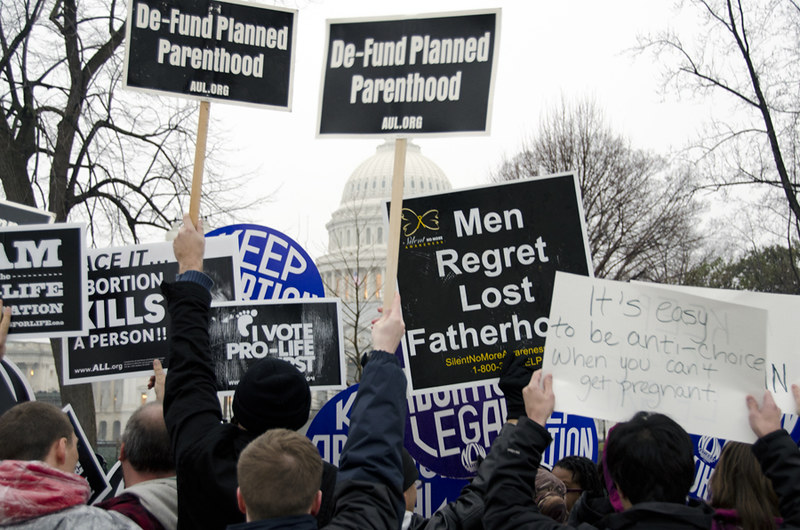Supreme Court Ruling on Mississippi Law may Overturn Roe v. Wade
Used with permission from Chris Wieland under creative commons.
On January 23, 2012, the anniversary of Roe Vs. Wade, anti-abortion activists and the National Organization of Women protested outside the Supreme Court. The pro-life supporters held up signs against Planned Parenthood, advocating for the Supreme Court to de-fund the organization.
January 1, 2021
On Wednesday, December 1, 2021, the U.S Supreme Court heard oral arguments regarding a 2018 Mississippi Law which seeks to prohibit abortion after a pregnancy reaches the 15-week mark.
Debating a Standard
Challengers of the Mississippi law claim it contravenes the legal precedent set by the 1973 Supreme Court ruling, Roe vs. Wade. This landmark ruling has allowed American women to legally procure medical abortions without government interference for over 48 years. Roe defined the “standard of viability” for a pregnancy – the point past which it cannot be terminated – at 24 weeks. Lawmakers from Mississippi have proposed changing that standard to 15 weeks of pregnancy, thus the conflict with Roe.
Mississippi Governor Phil Bryant initiated and backed the law that quickly made its way to the Supreme Court’s consideration. Opposition to the state law was mounted primarily by a single abortion clinic, the only one in Mississippi, which spoke out against the law. The clinic claimed that the 15-week restriction was unconstitutional, due to the conflict with Roe.
The Supreme Court is not the only legal arena in which the Mississippi law has found opposition. U.S. District Judge Taylor Reeves previously sided with the clinic’s point of view and initially struck down Bryant’s proposed law. Through a series of suits and countersuits, the Mississippi law still found its way to the nation’s highest court.
What is the precedent for overturning a Supreme Court case?
The best example of this is another landmark ruling, Brown v. Board of Education, from 1954. In this case, a team of lawyers argued against the “separate but equal” law established by a previous Supreme Court decision, Plessy v. Ferguson (originally decided in 1896). Through this process, the 1954 court analyzed specific content within the Constitution and concluded that Plessy v. Ferguson violated the Fourteenth Amendment, resulting in “separate but equal” being unconstitutional.
Pro-Choice Rationale
Pro-Choice activists argue that the standard set by Roe must remain intact because they define medical abortion a type of healthcare. Furthermore, they posit that restrictions on abortion most negatively affect poor or younger women who lack the resources of their older or more established counterparts.
In 2014, the Guttmacher Institute concluded that younger women, who also often lack career and relationship stability, received abortions the most: “…women aged 20–24 accounted for the largest proportion of abortions (34%) and had the highest abortion rate (28 per 1,000 women in this age-group) among all age-groups studied.”
Pro-Life Rationale
Pro-life activists have celebrated the Supreme Court’s willingness to reconsider the precedent established by Roe. The National Right to Life organization, the oldest Pro-life advocacy organization in the U.S., tweeted on Dec. 30 that Roe “[deprives] individual citizens, through their duly-elected representatives, from having a say in abortion policy.”
Their beliefs are founded in their interpretation of a child’s Constitutional right to “life, liberty, and…happiness.” Proponents of this belief system argue it would be unjust to deny such rights to an unborn child just because they are unable to speak for themselves.
New Justices, New Questions
Many watchers of the Supreme Court are interested to see how recent additions to the bench affect the outcome of this case.
From 2018 to 2020, the Trump Administration appointed several new Supreme Court members. In 2018 Justice Brett Kavanaugh took the place of retiring Justice Anthony Kennedy, and Justice Amy Coney Barrett replaced deceased Justice Ruth Bader Ginsburg in 2020. Both new additions have described themselves as conservative Republicans, which hypothetically shifts the political alignment of the Court farther to the right.
Wad(e)ing into the Future
Americans and Court Watchers abroad remain uncertain about the future of abortion rights in the U.S., as well as what might happen if other states begin to follow Mississippi’s lead. With the 15-week ban up for debate and the shifting political landscape of the Supreme Court, Roe Vs. Wade may not be standing in the next few years.
The Supreme Court is expected to release its verdict in June 2022.





